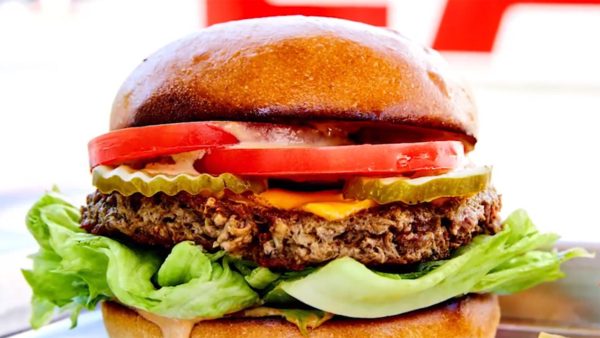
18 Feb To Your Health: Plant-Based Burgers, The Down Low
Dr. Alan Safdi, a world-renowned internist and gastroenterologist with encyclopedic knowledge of mind-body wellness and preventative medicine, posts on Telluride Inside… and Out under the banner of “To Your Health.” His blogs feature the most current information in his field: health, wellness, and longevity.
Winter and summer 2020, Dr. Alan is offering 14 seminars to medical professionals. The general public is welcome. Also this summer, he returns with his popular Live Longer Retreat wellness intensives. For all programs, go to his Telluride Longevity Institute website or sign up by calling 1-877-448-5416.
This week, Dr. Alan talks burgers – the plant-based varieties.

While plant-based burgers like Impossible Burger and Beyond Burger have fewer calories and less fat than products from some burger brands, they also have more sodium. That said, I have tasted these new plant-based variations on the burger theme and find them delicious – and a reasonable alternative when faced with a restaurant with limited whole food vegetarian options.
So let’s look at some of the data regarding these meatless burgers.
Today’s trendiest plant-based burgers differ from past offerings. Processed veggie, soy, and black bean burgers debuted in the 1970s. They contained processed vegetables (mushrooms, carrots, peppers among them), protein (soy or black beans), rice, oats, and corn oil. Many remain on the market today.
The new plant-based varieties combine protein (soy, pea, bean, or brown rice) with oils (coconut, sunflower, or canola) and methylcellulose and food starch as binders, depending on the brand. “Impossible” also uses heme―a molecule naturally occurring in plants―to give its burger added flavor. “Beyond Meat” uses beet juice extract, apple extract, and natural flavors to achieve the same goal.
In terms of ingredients, the two best-known veggie burgers are pretty similar, the exception being the main source of protein. Beyond Meat uses pea protein instead of soy protein, and there’s no soy leghemoglobin, which is “Impossible’s” key ingredient. That’s what makes the burger “bleed.”
Coconut oil is another main ingredient in both “Beyond” and “Impossible” products.
While there might be some public support for coconut oil’s health benefits, the overall body of research and research-based recommendations say to limit coconut oil, and that coconut oil fats are not as healthy as other plant-based, unsaturated oils, like olive or canola. Coconut oil is actually one of the most saturated fats you can consume.
The addition of coconut oil gives “Beyond” and “Impossible” comparable saturated fat levels to beef: “Beyond” has 6 grams, “Impossible” 8 grams, and beef 7.6 grams.
Among traditional veggie burgers, Morningstar Farms has 0.5 gram of saturated fat, Gardenburger 1.5 grams. and Boca 1 gram.
Traditional veggie burgers range from 100 to 110 calories.
Most Americans eat too much red meat, so including more vegetables in their diet is a really healthy thing to do. However, even though these burger choices are vegetarian, it is not the same as actually eating vegetables. The burgers are processed vegetarian products.
Three of the top-selling traditional veggie burger products – Kellogg-owned Morningstar Farms Garden Veggie Burgers and Kraft Heinz’s Boca Veggie Burgers – also contain soy. Morningstar Farms has 11 grams of protein per 67 gram burger, and a 71 gram Boca burger has 13 grams of protein.
Another popular veggie burger, Gardenburger, also put out by Kellogg, contains cooked brown rice, mushrooms, and rolled oats as its first three ingredients. These whole foods offer good sources of fiber. Gardenburger has 5 grams of protein per 71 gram burger.
Plant-based burgers contain some fiber, which could be considered a benefit red meat does not offer. Individuals who eat diets high in fiber tend to have lower risks of cardiovascular disease, cancer, constipation, diverticulosis, and diabetes.
Another reason to have any vegetable burger is environmental. Raising animals for human consumption contributes significantly to man-made climate change.
Personally I like the old-fashioned, more traditional vegetable burgers that have more whole foods, fewer calories, and less sodium. We need to try to avoid ultra-processed foods. Diets proven over the years to have durable health benefits include the Mediterranean Diet, New Norwegian Diet, and the Dash Diet. The more you choose whole foods over highly processed foods equates to better health overall and hopefully better health outcomes – although I will still eat these new burgers occasionally.
Dr. Alan, more:

Dr. Alan Safdi is board-certified in Internal Medicine and in Gastroenterology and is a Fellow of the American College of Gastroenterology. A proven leader in the healthcare arena, he has been featured on the national program, “Medical Crossfire” and authored or co-authored numerous medical articles and abstracts. Safdi has been involved in grant-based and clinical research for 30+ years and is passionate about disease prevention and wellness, not just fixing what has gone wrong. He is an international lecturer on the subjects of wellness, nutrition and gastroenterology.
And back by popular demand, this summer, in partnership with the Peaks’ Spa, Dr. Safdi returns with his three, week-long wellness intensives titled Live Longer Retreat.
Again, using an evidence-based, scientific approach to health and longevity and featuring an experienced staff of medical professionals, personal trainers, Pilates and yoga instructors, dietitians, and chefs, the focus is on your unique wellness profile. Each Live Longer Retreat is one-of-kind in the U.S. Those intensives, limited to only 10 – 15 participants, will include personal consultations, hiking, spinning, yoga, Pilates, talks and demonstrations related to nutrition, cooking classes, and more.
Go here to read a review of the experience by one very satisfied participant.


Sorry, the comment form is closed at this time.